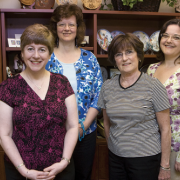|
 Ellen Badger and Liz Droz drew deep breaths and waited silently. The visit would not be a pleasant one. Ellen Badger and Liz Droz drew deep breaths and waited silently. The visit would not be a pleasant one.
Droz, director of the Binghamton University Counseling Center, and Badger, director of the university’s International Student and Scholar Services, stood outside the apartment of two doctoral students who were close friends of Almir Alves, a visiting scholar from Brazil.
Alves arrived in September 2008 to do postdoctoral work in Binghamton’s department of mathematical sciences. On April 3, he was at an English as a Second Language (ESL) class at the American Civic Association when gunman Jiverly Wong burst into the downtown Binghamton building and opened fire, killing Alves and 12 others before turning the gun on himself.
Badger and Droz, both UUPers, paid their visit the day after the attack, offering solace and aid to the stunned couple, who still faced a morbid task: contacting Alves’ wife with the horrible news.
Droz consoled and counseled the couple, advising them on how they should break the news to Alves’ wife. When they realized they didn’t have a working number for Alves’ wife, Badger supplied one on the spot.
Aid for the shell-shocked
That scene repeated itself in the days after the rampage for Droz, Badger and more than a dozen UUPers in their departments. In true union spirit, the UUPers reached out to the university and the community, offering support to families and co-workers of attack victims, making hospital visits to those wounded in the shooting, attending memorial services and helping anyone—on or off campus—shell-shocked by the tragedy.
“To hear stories from the people who were there adds a level of horror that just shakes you to the core,” said Badger. “We’re hearing from people telling us that they’re afraid of classrooms, that they can’t go back into classrooms again.”
The shootings had a far-reaching effect on campus. Binghamton has about 2,000 international students and 70 visiting scholars, many of who live near and work at the university’s downtown campus, a few blocks from where the shootings took place. Many travel with family members, who enjoyed taking ESL classes at the association.
“Almost half the university had a direct connection to the (attack),” said Binghamton Chapter President Darryl Wood.
One victim, Layla Khalil, was the mother of a Binghamton graduate student. Khalil, an Iraqi librarian who survived three car bombings in Iraq, came to Binghamton to be with her daughter, Bhan, and to flee the violence in her country.
“Every day, we see the ripple effect,” Droz said. “We’ve been meeting with spouses and students who are having problems coping. The only way out of the building was past the bodies, which they saw. They don’t want to be disabled by this, but that’s what happened and they have to talk about it, which they’re willing to do.”
Mourning a loss
UUPer Tom Sinclair understands. Sinclair, an associate professor in the department of public administration, lost his friend, Li Guo of China, in the massacre. Sinclair recruited Guo, a visiting research scholar from Shenzhen University, to come to Binghamton in August 2008 to work on an exchange program between the schools.
“She just loved learning English and being part of a community of people learning English,” Sinclair said. “Fortunately, the university was great in making (counseling) resources available to everybody and it’s helping.”
That help came quickly and hasn’t stopped. Together, Droz and Badger planned for the aftermath just minutes after news of the shooting broke.
Ready for the worst
As news trickled in, Badger began determining victims and survivors. She made calls, sent e-mails and used news reports and a police list of survivors to identify who might need support. Her sleuthing paid off; most times, Badger’s office phoned families of victims and survivors minutes after police contacted them.
Since then, she and her staff have worked with state and federal officials and foreign consulates to clear the way for victims’ family members to come to Binghamton. She’s dealt daily with organizations like the Red Cross and other local social services to aid survivors. It was she who made sure that Alves’ belongings were returned to Brazil.
For Droz and her staff, the tragedy has meant listening and providing psychological support to survivors, students, staff and their families, some of who are still paralyzed with fear from the attack.
Others are just now coming forward or starting to talk thanks to outreach efforts by Droz and her staff; they have attended local ESL classes to seek out those in pain.
“This (tragedy) has completely redefined my work,” she said.
One thing is certain: these are wounds that won’t heal quickly.
“This tragedy is not how Binghamton or the university defines itself,” Badger said. “It’s how we respond that defines us.”
— Michael Lisi
(Editor’s note: The Voice would also like to recognize the following Binghamton staff members for their continued service: J. Thomas Cousins, Donald Glauber, Karen Keefe-Guzikowski, Nancy Lamberty, Dara Raboy-Picciano, Beth Riley, Deborah Rosenbaum, William Russell, Randi Ellen Scheiner, Amelia Shafer, Diane Sliwinski and Vanessa Sloat.)
|


